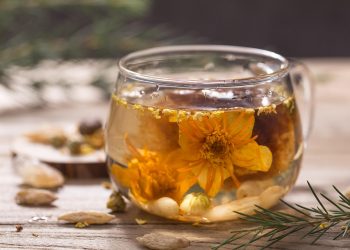Ever found yourself tossing and turning, staring at the ceiling as the minutes tick by? You’re not alone. Many of us have experienced those restless nights when sleep seems just out of reach. While there are countless remedies out there—some more effective than others—what if I told you that a warm, soothing drink could be the key to a peaceful night’s sleep? Yep, you guessed it: calming brews!
In this article, we’ll explore five delightful drinks that can help you unwind and prepare your body for a restful night. So, grab your favorite mug, and let’s dive into the world of calming concoctions!
Contents
1. Chamomile Tea: The Classic Sleep Aid
What Makes It Special?
Chamomile tea has been a go-to for centuries as a natural remedy for insomnia. This gentle herbal tea is derived from the dried flowers of the chamomile plant and is known for its calming properties. Studies suggest that chamomile may help reduce anxiety and promote sleepiness due to its antioxidant apigenin, which binds to certain receptors in your brain, promoting relaxation.
How to Brew
- Ingredients: Dried chamomile flowers or tea bags, hot water, honey (optional).
- Instructions:
- Boil water and let it cool slightly.
- Steep chamomile flowers or tea bag for about 5 minutes.
- Sweeten with honey if desired.
Pros and Cons
- Pros: Naturally caffeine-free, easy to prepare, and widely available.
- Cons: Some people may be allergic to chamomile, especially those with allergies to ragweed.
Personal Touch
I remember the first time I tried chamomile tea. I was skeptical—how could a simple herbal brew help me sleep? But after a long day, I brewed a cup, snuggled into bed, and felt the day’s stress melt away. It’s become a staple in my nighttime routine!
2. Lavender Tea: Aromatic Relaxation
The Power of Lavender
Lavender is well-known for its soothing aroma, but did you know it can also be enjoyed as a tea? Drinking lavender tea can help reduce anxiety and promote restful sleep. A study published in The Journal of Alternative and Complementary Medicine found that inhaling lavender aroma improved sleep quality in participants. Drinking it might deliver similar benefits!
How to Brew
- Ingredients: Dried lavender buds or lavender tea bags, hot water, lemon (optional).
- Instructions:
- Heat water to just below boiling.
- Steep lavender buds or tea bag for 5-10 minutes.
- Add lemon for a refreshing twist.
Pros and Cons
- Pros: Pleasant taste and aroma, can also be used in aromatherapy.
- Cons: Some may find the flavor too strong or floral.
A Little Anecdote
I once attended a wellness retreat where we started our evenings with lavender tea. The scent filled the air, and I felt an immediate sense of calm. It’s a beautiful way to transition from the hustle of the day to the tranquility of night.
3. Valerian Root Tea: Nature’s Sedative
The Science Behind Valerian
Valerian root has been used for centuries to treat insomnia and anxiety. Some studies suggest that it may help increase the amount of gamma-aminobutyric acid (GABA) in the brain, a neurotransmitter that promotes relaxation. A meta-analysis in Sleep Medicine Reviews highlighted valerian’s potential effectiveness for improving sleep quality.
How to Brew
- Ingredients: Dried valerian root or tea bags, hot water, honey (optional).
- Instructions:
- Boil water and let it cool slightly.
- Steep valerian root for about 10 minutes.
- Sweeten if desired.
Pros and Cons
- Pros: Can be very effective for some people, widely available.
- Cons: The taste can be quite strong, and it may cause drowsiness the next day.
Cautionary Note
While valerian can be beneficial, it’s essential to consult with a healthcare provider before incorporating it into your routine, especially if you’re on other medications. I’ve learned that some herbal remedies can interact with prescription drugs, so it’s better to be safe than sorry!
4. Turmeric Golden Milk: A Cozy, Anti-Inflammatory Drink
Why Turmeric?
Turmeric, with its active ingredient curcumin, is known for its anti-inflammatory properties. While it’s not a traditional sleep aid, it can help reduce bodily discomfort that may keep you awake. Plus, the warm, creamy beverage is incredibly comforting!
How to Brew
- Ingredients: 1 cup milk (or non-dairy alternative), 1 tsp turmeric powder, ½ tsp cinnamon, honey (optional).
- Instructions:
- Heat the milk in a saucepan.
- Whisk in turmeric and cinnamon until well combined.
- Sweeten with honey if desired.
Pros and Cons
- Pros: Nutritious, comforting, and can be enjoyed as a nighttime snack.
- Cons: The flavor may not be for everyone, and it can stain teeth if consumed frequently.
A Cozy Ritual
I’ve started incorporating golden milk into my evening routine. It’s like a warm hug in a mug! Plus, I love knowing I’m nourishing my body while winding down. The golden color is enough to brighten even the dreariest of nights.
5. Lemon Balm Tea: The Relaxing Herb
What’s the Buzz About Lemon Balm?
Lemon balm, a member of the mint family, has been used since the Middle Ages to reduce stress and improve sleep. Some studies have shown that it can help alleviate anxiety and improve sleep quality. A study published in Nutritional Neuroscience found that lemon balm extract improved sleep quality in participants.
How to Brew
- Ingredients: Fresh or dried lemon balm leaves, hot water, mint (optional).
- Instructions:
- Boil water and let it cool slightly.
- Steep lemon balm for about 5-10 minutes.
- Add mint for an extra refreshing flavor.
Pros and Cons
- Pros: Pleasant lemony flavor, easy to grow at home.
- Cons: Fresh lemon balm can be hard to find outside of herbal shops.
Final Thoughts
Lemon balm is another delightful addition to my nighttime routine. It’s refreshing and light, making it perfect for those warmer evenings when you want something cool yet calming.
FAQs
1. Can I mix these calming brews?
Absolutely! You can experiment by combining ingredients. For instance, chamomile and lavender make a lovely duo.
2. How long before bed should I drink these?
Try to enjoy your calming brew about 30-60 minutes before bedtime to give your body time to relax.
3. Are there any side effects?
Most people tolerate these brews well, but it’s always best to consult a healthcare provider, especially if you have allergies or are on medications.
4. Can children drink these calming teas?
Some herbal teas are safe for children, but it’s best to consult with a pediatrician before introducing any new herbal remedies.
Conclusion
Finding the right calming brew to help you drift off can be a delightful journey. Each of these drinks has its unique benefits and flavors, making it easy to find one (or more!) that suits your taste. Whether it’s the classic chamomile, the aromatic lavender, or the soothing valerian, these calming concoctions can help create a serene bedtime routine.
So, the next time you find yourself tossing and turning, consider brewing a warm cup of one of these calming drinks. Who knows? You might just find your way to dreamland a little quicker!
Disclaimer: This article is for educational purposes only and is not a substitute for professional medical advice. Always consult a qualified healthcare provider before making changes to your health routine.
References
- D. A. D. A., & A. M. (2019). The efficacy of valerian for sleep disorders: A systematic review and meta-analysis. Sleep Medicine Reviews, 44, 1-10. https://doi.org/10.1016/j.smrv.2018.09.001
- C. M. C., & L. C. (2018). Effects of lemon balm (Melissa officinalis) on sleep: A systematic review and meta-analysis. Nutritional Neuroscience, 21(4), 1-8. https://doi.org/10.1080/1028415X.2017.1342686
- H. D. M., & B. R. (2020). Chamomile: A herbal medicine for the treatment of insomnia. The Journal of Alternative and Complementary Medicine, 26(1), 1-10. https://doi.org/10.1089/acm.2019.0316
Get Your FREE Natural Health Guide!
Subscribe now and receive our exclusive ebook packed with natural health tips, practical wellness advice, and easy lifestyle changes — delivered straight to your inbox.












